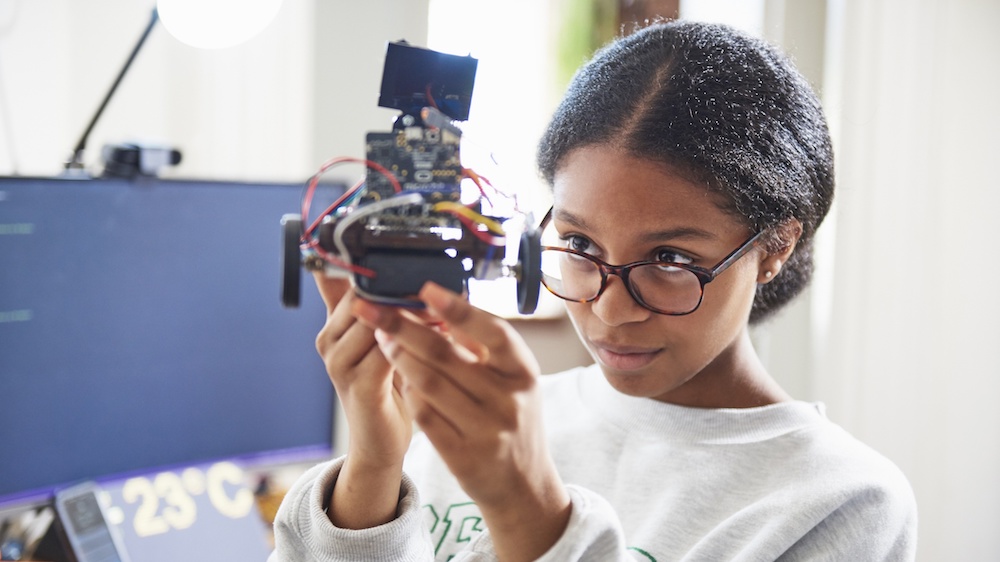If you’re interested in sharing your opinion on any cultural, political or personal topic, create an account here and check out our how-to post to learn more.
____
When I look back on my roots, my career path is unconventional. My family moved to the South Bronx from Dominica, a small island nation in the Caribbean, where my mother worked as a teacher. While navigating a new life as a recent immigrant in New York City, she somehow found the time to study and earn her teaching certificate. She believed wholeheartedly in the power of education and knowledge to transform people’s lives. And she passed her passion for education onto me.
As a young girl I would spend hours disassembling and reassembling any household item or contraption I could get my hands on — much to the chagrin of my siblings. I was endlessly fascinated by the precision and creativity that went into designing and constructing appliances and electronics. It surprised no one when I left the city after high school to study mechanical engineering at SUNY Buffalo.
I was surprised to be the only Black woman in my graduating class. I was proud of my own achievements and excited to begin a fulfilling career in a field I worked tirelessly to break into, but why was I such an exception? Where were the students from other underrepresented communities? How could I help other Black women with similar dreams?
According to Pew, Black workers make up just 5% of engineering and architecture jobs in the United States, and women account for merely 1 in 5 engineering and computer science graduates. I don’t need to tell you that the statistics are most grim for women of color. Meanwhile, the gender pay gap in STEM professions is larger than in other industries — and as Pew notes, the gap continues to grow even today.
After school, I took a great job with the U.S. Department of Energy and eventually moved into the private sector. I loved my work and admired my colleagues. I see now how that role shaped my unexpected career journey. Over time, I decided to drive the change I was seeking, and dedicate myself to rewriting the rulebook.
Today, I oversee all Corporate Social Responsibility efforts for IBM, where I make meaningful investments in education and skills initiatives, many of which were created to aid communities of color. I’m proud to work on a team that is wholly committed to teaching others and expanding opportunities for Black and brown communities. Last year, we launched a $100 million quantum education and research initiative for Historically Black Colleges and Universities (HBCUs) to prepare and develop talent at HBCUs from all STEM disciplines for the quantum future. We hosted 247 HBCU faculty at the IBM Skills Academy to ensure they’re prepared to mentor students in AI, blockchain, cloud computing, cybersecurity, data science, design thinking and the Internet of Things. And we recently hired 1,000 interns from our P-TECH program to help students from underserved communities gain real-world experience and learn from mentors already working in the field. As part of IBM's groundbreaking commitment and plan to skill 30 million people globally by 2030, we’re providing online training through IBM SkillsBuild to enhance career opportunities across all ages and walks of life.
I’m proud of our work and so excited to see new pathways for underrepresented women to pursue careers in STEM. On this International Day of Women and Girls in Science, think about what you can do to lift Black women up — starting with yourself. Are you a student or just starting out in a new career? Set out to learn as much as you can, whether through school, reading, finding a mentor or an online portal like IBM’s SkillsBuild (which is free, by the way). Are you an established professional? Reach out to young colleagues and offer to be a sounding board and support system.
We are celebrating the progress we’ve made and calling on more leaders and companies to make real commitments in diversity, gender parity, pay equity and closing the STEM gap. It turned out that my dream job in STEM is helping other women find their dream jobs.
____
Justina-Nixon Saintil is the Vice President and Global Head of Corporate Social Responsibility at IBM.
